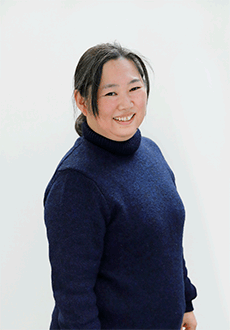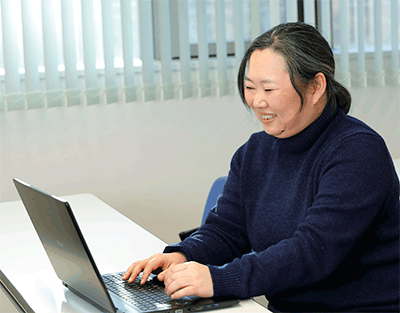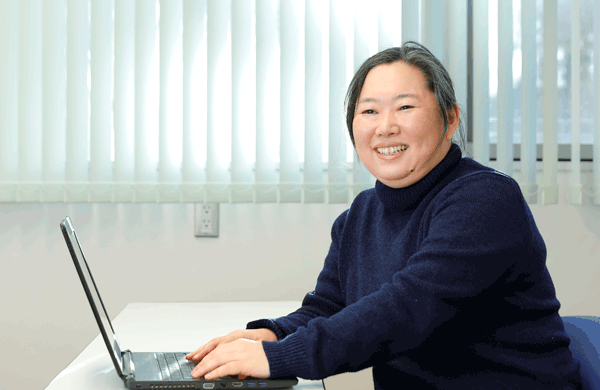I overcame my aversions and entered the Engineering Department; now I use the knowledge I built up to take on new challenges (Hatsumi Nakata, Senior Technical Scientist)

Many women active in a variety of fields work at RIKEN BRC. We interviewed 12 of these women for their insights on how they continue to flourish with work styles that fit their particular lifestyles.
In this interview, we spoke with Hatsumi Nakata, Senior Technical Scientist in the Experimental Animal Division.
She is always improving her skills by participating in the formation of new divisions and earning credentials. She spoke to us about her thoughts on work, motivation, and hopes for the future, among other topics.
Profile
- Hatsumi Nakata
- Senior Technical Scientist, Experimental Animal Division
- Nakata joined RIKEN in 1994. After working in the Gene Bank Division, the Cell Engineering Division, the Cell Material Division, and the Gene Engineering Division, she joined the Experimental Animal Division in 2001. Currently, she is involved with customer operations, distributions and deposit management, as well as mouse gene identification and technology development.
My interest in biology since high school led me to study in the engineering department, and my days as a researcher are fulfilling.
I first became interested in biological research when I was in high school during the biotechnology boom. The high school I went to was in the countryside in Shikoku, and had a full array of biology-related equipment donated by local companies, such as bio-clean benches. Another factor that spurred my interest was after-school activities I participated in, when we performed callus culture for carrots and meristem culture for tropical orchids. I found all of this really interesting.
When we chose between the sciences and humanities tracks in our second year of high school, since selecting humanities would limit which departments we can take entrance exams for, I chose the sciences. I hadn’t really liked math, chemistry, and physics, but I wanted study biology, so I studied really hard and got into the Engineering Department and then graduate school.
When I was looking for a job in the first year of graduate school, I happened to see an advertisement for positions at RIKEN in a magazine, so I applied and got the job. My discovery of RIKEN was an accident, but I have been here ever since because of how easy it is to work here and how comfortable it is.
One reason for this is the flexible work styles. We have a lot of freedom, and can decide ourselves how we spend our time, and every year more programs and infrastructure are put into place to make it easier for women to work. I’ve been able to create a work–life balance that matches the particular period in my life, so that work takes up a greater percentage of my time when I want to really immerse myself in research, but I could go home in the evening once I had a child. Now that my child is older, I’m able to take time for myself to engage in hobbies like yoga and Zumba, so every day is really satisfying.
I use the knowledge I built up to take on new challenges.

A few years after joining RIKEN, it becomes easier to request transfers to other divisions. Starting new research in other divisions when you’ve done what you can in another place allows you to expand your knowledge and makes things interesting, I think.
In my case, for the seven years after I started working at RIKEN, I was in a division that worked on gene stock, but in 2001, the current BRC (BioResource Research Center) was established, and this was just when I came back to work after having my child, and I wanted to participate in the launch of resources operations in the Experimental Animal Division, so I transferred to this division.
I started everything from scratch, like creating a database of users and a catalog of mice. This was a new field, but I was able to build up a foundation I was satisfied with while using my experiences and knowledge gained in my prior work in other divisions.
It has been 20 years since this division was started, and now we receive requests from many research institutes and universities, which makes me feel like I’m really helping to support a wide range of research. I also hear from researchers that my advice helped their research go well, which makes me very happy and also motivates me.
My life becomes more fun every time I build up my experiences.
I like research itself, but with every year that goes by, work becomes more and more fun. I think this is because, depending on experience and the extent to which you work, your capacity expands and you can sense your own growth.
One example is earning credentials. Since I began working at RIKEN, I’ve earned a wide range of credentials directly related to my work, such as national IT-related credentials, Quality Management Systems auditor (ISO 9001 Associate auditor) certification, International Cargo Agents Training Programme certification (IATA Dangerous Goods Operations Diploma), and Quality Control verification (QC verification).
Earning credentials not only expands the scope of work, but has also expanded the scope of my thinking about things. This is because training and group meetings to maintain credentials held outside RIKEN have given me opportunities to talk to people from various industries. Previously, when we developed a kit for inspections of genetically modified organisms with the help of a private-sector company, I was able to exchange opinions with the people I met there, which was really instructive.
My current objective is to train the next generation. If we can integrate what we have built up so far with the opinions of younger people, I think we’ll find ways of carrying out research that have never been thought of before. To achieve this, I hope all team members can cooperate and create an environment in which people of all generations can flourish in their work.
